Last updated on November 19th, 2023
Featured image: Crowded marketplace in Morocco / Photo by Jorg on Adobe Stock
Nine tips to help you travel solo safely
By Susan Dresner, Guest Writer
Wondering how to travel solo safely in Morocco? Susan Dresner is a New York travellin’ woman who has experienced Morocco four times and absolutely loves it. We asked Susan about her best tips to travel solo safely in Morocco. These are the female-friendly bits of advice she happily offers other JourneyWomen worldwide…
Editor’s Note: This article has been in our archives for quite awhile. That means that while the tips are probably still sound, the prices quoted probably have gone up. Please do your own pre-trip research where amounts are quoted.
Susan’s tips for travelling solo in Morocco
1. Get a good guidebook…
Start with a really comprehensive, well-written guidebook. Cadogan’s Morocco by Barnaby Rogerson was my first inspiration to explore and is (in my opinion) the classic on Morocco. This guide includes history, detailed itineraries, culture, maps, very balanced, if not unusual places to stay, eat, shop, etc.
2. Find safe transportation…
Finding safe transportation is important when it comes to learning how to travel solo safely in Morocco. Inside cities, go by foot, map in hand, around the labyrinthine medina (old quarter) or (best of all) hire a city guide recommended by your lodgings until you get your bearings. Once you’ve had this orientation, then it’s relatively safe to explore on your own; just keep looking for familiar shops and landmarks. To get about the sprawling New City, hire a petit taxi; your B&B host should, again, be able to recommend someone reliable. This type of transportation is both efficient and inexpensive. Always make sure you agree on a price before getting into the car.
For longer distances outside of the city, from one city to another, or into rural areas, treat yourself to a grand taxi, a private car – normally a Mercedes – which can run about $50-$75 a day if hired directly (get a name from someone you trust).
Arrange the price beforehand, and know that you are not expected to pay for the driver’s meals, lodgings or gas.
Stay firm with your itinerary; never get detoured to places the driver wants to take you. Remember a driver always gets commissions on anything you buy while you’re with him so (for example) if you don’t want carpets, don’t let him stop at a carpet factory.
I usually avoid public buses. True, they’re colourful and cheap, but also crowded, slow, hot and often, unsafe. This form of transportation is also known for the hustlers who prey on innocents from abroad. If you do take buses, be sure to watch your belongings very, very carefully.
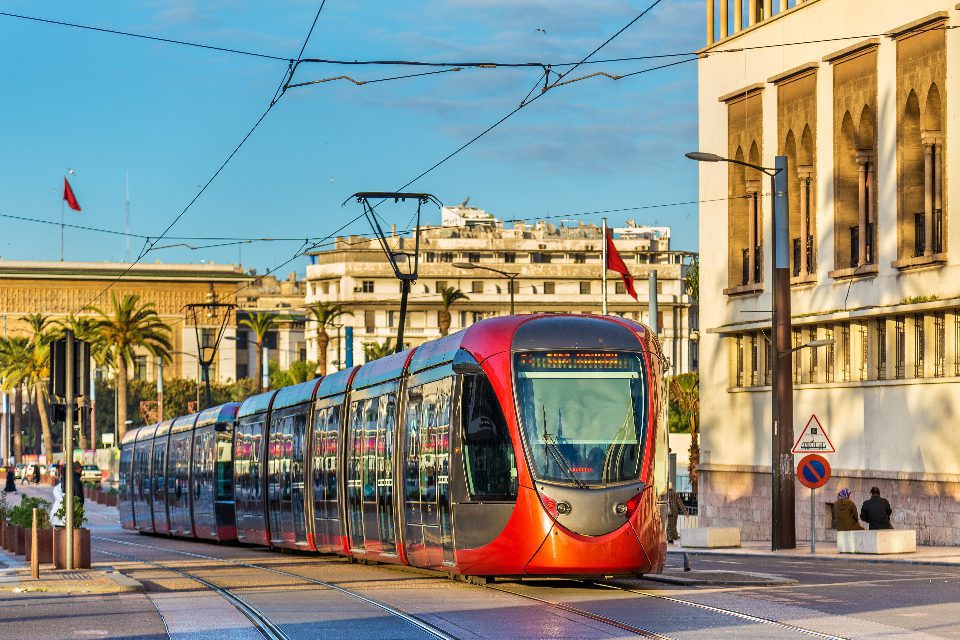
Modern tram in Casablanca, Morocco / Photo by Leonid Andronov on Adobe Stock
3. Good guides are important…
To travel solo safely in Morocco, particularly in remote areas, hire a licensed mountain guide (lists provided by the Moroccan National Tourist Board at 212.557.2520 in NY) who can charge from $US35-$50 a day without transport. Most speak a little English or French but rely on their Arabic and Berber. Guides can arrange for a Land Rover or a mule (for an extra fee) depending on where you’re headed.
These trips to remote areas can be the most challenging, difficult excursions to arrange on your own, but the most rewarding kind of travel. Get a glimpse of Morocco fifty years ago (and perhaps centuries past). Your guide will take you into the world of the Berbers: traditional, generous, curious people. I found my first guide, Aziz, in the Office of Mountain Guides, in Kalaa M’Goun, mentioned in the Cadogan guidebook, Morocco. His e-mail address is [email protected]. It’s important that you write in simple English that he will be able to understand.
Ed. note: We also recently received several e-mail tips from JourneyWomen about a guide in Fez. We haven’t used him ourselves but following up might be helpful to other travellers…
We found a great guide in Morocco! I just returned from travelling through Morocco with two friends of mine. We had a wonderful time and I would highly recommend it to any and all. Specifically, I wanted to recommend a guide that I found through a posting on the JW website. His name is Ali Mouni. Ali is a wonderful guide who speaks several languages fluently. Unlike another guide we used in Fez, Ali never pressured us to buy anything, nor did we ever feel like he took advantage of us. Instead, Ali offered us a rare insight into the way of life of Berbers in Morocco, particularly nomadic Berbers who live in the mountains, either in tents or in caves. Through Ali, we were able to meet some of these fascinating people and get a glimpse of what their incredibly hard lives are like. We would never have had this special opportunity without him. I highly recommend his services to other women.
Sue, Philadelphia, USA
4. Learn some Arabic…
Very little English is spoken outside some of the posher places catering to North Americans and other English-speaking tourists. Rudimentary French and Arabic are languages of commerce and intellectual matters (in the banks, stores, cafes). Arabic is the state language, taught in the schools, but in the rural areas, three major Berber dialects, depending on geographic locale, are the lingua of folk. However, a smile, a nod, and a few Arabic words go a long way in getting what you need. Here are a few words to help you along your way.
Please: “afek”
Hello: “Salam A’la Kom”
Good-bye: “Bismallah”
No: “la” and Yes: “Eeyeh”
Thanks: “shoukran”
God willing: “Insh’Allah”
Washroom: “vaysay” or good, old-fashioned, “W.C.”
Find a Women-Friendly Tour to Morocco
Find a women-friendly tour anywhere in the world on our Women’s Travel Directory
6. Dress with sense…
To avoid pestering men (in the guise of offering to help any ladies in distress), don’t look like an obvious tourist. Dress conservatively, covering arms and below the knees. To blend right in, and therefore go about freely, I walk tall and dress like the local women — fine cotton kaftan and head-wrap, kohl-eyed, wearing heaps of costume jewelry.
Remember that many of the roads tend to be cobbled stones, and often muddy after the rain. Wear comfortable, closed shoes and not sandals. In open shoes, your feet can get wet, very dirty, or worse, stepped on by animals.
7. Be culturally correct…
As in all countries, do your best to respect the culture and customs. Moroccans are very proud, traditional people who expect women to act formally in public. Smile a lot with your mouth and eyes. Speak quietly, but firmly. Hand gestures are welcome but don’t touch anyone or pick up food with the left hand. Never look into a man’s eyes while speaking or initiate physical contact with him. Dark glasses and a fake (if necessary) wedding band are wonderful deterrents.
By all means, trust your gut and consider invitations to visit families, and always bring a small gift (special delicacy, something for the house or hostess). Try to verify with someone at your hotel or B&B whether they know the person who has invited you and whether this is a proper invitation you can accept. Always wash hands, as is the ritual, before sharing food with your host and hostess.
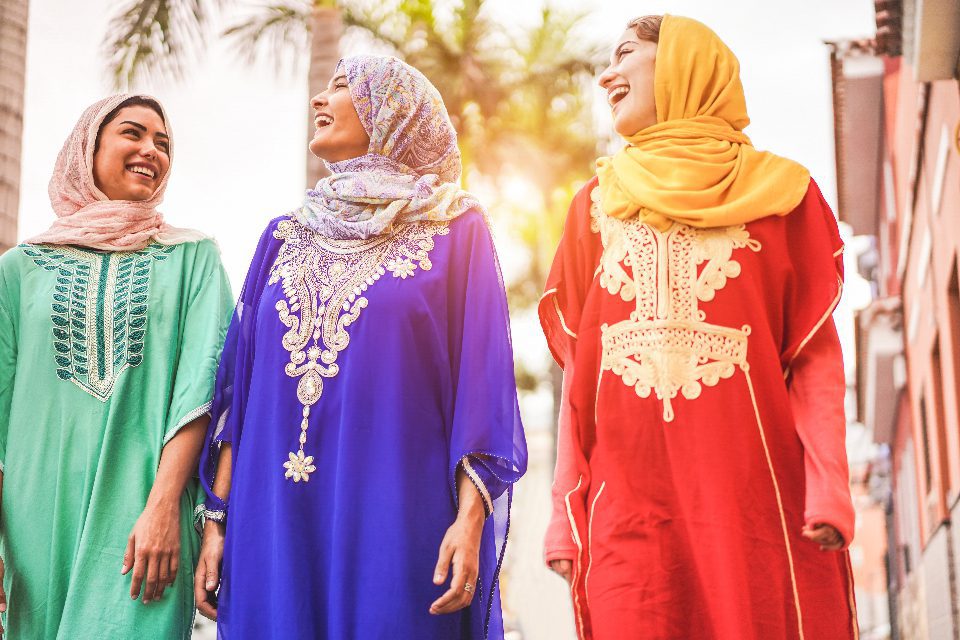
Happy Arabic friends stroll the streets of Morocco / Photo by DisobeyArt on Adobe Stock
8. Seek out local women…
These encounters will always enrich your experiences in Morocco. Women are more free to express themselves amongst one another, and thus you can learn at close range about the culture. I found that there are three main places to find women:
Hammam (a segregated-by-gender steam bath): where women congregate to clean, beautify, exchange news and information, relax, and get ad hoc childcare advice. Neighbourhood hammams are inexpensive, ritualized fun, and let you be part of a community. Ask a staff member where you’re staying to take you the first time or arrange another way. Once, in an antique store in Essouira, I asked the owner about the hammam she goes to. She not only escorted me but provided all the bathing accoutrements.
Markets: especially on certain days of the week (varies in each locale), women do the food shopping. Hang out with them and watch how real bargaining is done.
At home: off with the veil, anything goes. Women are wickedly funny, sensuous, and deeply caring at home. The first time I accepted an invitation to visit a Moroccan family, it was from my waitress at the hotel. I didn’t know what to expect. Inside the kasbah where her family lived, in a private courtyard, I found her sisters, mother, and grandmother laughing uproariously while they danced to Michael Jackson on a boombox. When I joined in, granny pinched my bottom and motioned to her rotating hips. Wow, I thought, so this is what goes on behind the veil!
9. What should I wear?
Dressing appropriately is important when it comes to knowing how to travel solo safely in Morocco. In true Journeywoman fashion, readers continue to offer their advice on culturally correct clothing in Morocco. Here are a few of their suggestions in addition to the ones that Susan Dresner included in her article.
Check out these tips submitted by our readers on what to wear in Morocco
Keep cool…
When in Morocco, some Western women have the idea that it’s a strong political statement to wear western clothes, the likes of which you might see in a park or on a beach in Toronto or Miami. Although I readily call myself a modern, assertive woman, I think the unisex Djellaba (long, loose coat worn over clothes) is a wise idea. Here’s why:
— You can easily string your money/passport pouch under the dress and while you can easily access the cash and ID via the slits in the side of your djellaba, a thief will have to work much harder for it.
— If you get a thick or dark colored djellaba, you don’t really have to wear much under it. This is very freeing (also true of the chador and abaya).
— If you put on your djellaba the day you arrive, it looks like you’ve been there longer than you have and you’re less likely to be hassled by hustlers.
— For the same reason as above, you’ll get better prices in the souk (unless the djellaba is blindingly new).
— You’ll find it harder to speak to local women if you appear to disregard their culture.
— It cuts out the “what am I going to wear today” stress that’s a real annoyance when travelling.
— And, besides, they’re quite cool in the heat and beautiful as well with a wide array of colours and variations on the basic design. Happy souking, ladies!
Buffy, Toronto, Canada
Loose clothing is best…
My advice is to wear loose clothing such as baggy pants or long skirts and a loose-fitting blouse or t-shirt. Not only will it keep you cool and protected from the sun, but it will lessen unwanted attention received by local men. Tight or revealing clothing always invites attention (the local women get harassed too); short pants are not worn by Moroccan women. Note: you will see all dress styles in the large cities in Morocco from total veiling to revealing. As a foreign woman you will be an attraction to the local men; wearing loose clothing will reduce the harassment. Save the tighter clothes for your own home city. Remember that Moroccans are friendly, curious people who like to find out about you. Don’t be afraid to chat with them, especially the hanout (small store) owners. Many people speak some English and will be delighted to hear you say a word or two in Arabic. Final tip: wear a wedding band and invent a husband if you don’t have one.
Sheri, Rabat, Morocco
Covering your head not necessary…
In Morocco, foreign women should try to buy a djelleba (traditional dress with hood, that so many of the Moroccan women wear). If you do this, you’ll be very comfy and will not stand out as a foreigner. Covering your head isn’t necessary as many Moroccan women don’t, but you can if you want to. If you dress to blend in, you will not be a target for the beggars and con-artists. Please note that Moroccans in Marrakech, Fez and small villages are more traditional than Moroccans in the larger cities like Rabat, Casablanca and Tangier.
Bailey, Erie, USA
For more tips on how to travel solo safely in Morocco, visit our Women’s Guide to Morocco here.
Read More on Morocco
Maria Dueñas’ Wartime Spy Novel “The Time In Between” Travels Back to 1930s Tangiers
In Maria Duenas’ “The Time In Between”, we learn about the Spanish Civil War from the perspective of a seamstress turned skillful spy.
Africa’s Secret Places: Less-Travelled Destinations for Solo Women
With 54 sovereign countries, the African continent offers solo women vibrant communities, a range of wildlife and diverse cultures.
Travel by Book to Tangier, Morocco with “Tangerine” by Christine Mangan
For our March 2023 book of the month, we return to Morocco, for a gripping psychological thriller set in 1950s Tangier.

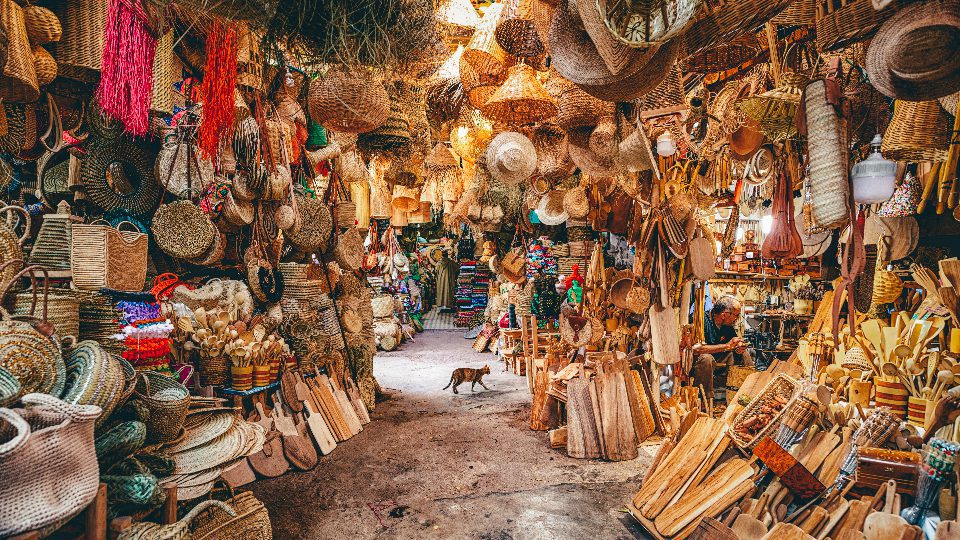

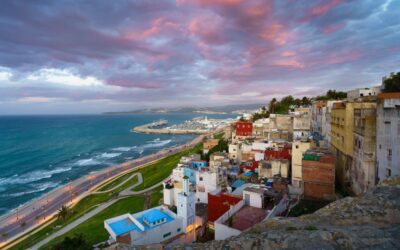
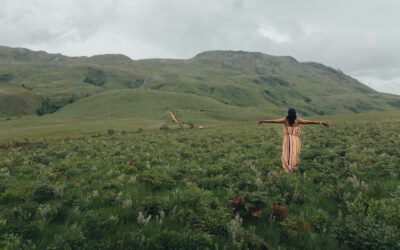
0 Comments
We always strive to use real photos from our own adventures, provided by the guest writer or from our personal travels. However, in some cases, due to photo quality, we must use stock photography. If you have any questions about the photography please let us know.
Disclaimer: We are so happy that you are checking out this page right now! We only recommend things that are suggested by our community, or through our own experience, that we believe will be helpful and practical for you. Some of our pages contain links, which means we’re part of an affiliate program for the product being mentioned. Should you decide to purchase a product using a link from on our site, JourneyWoman may earn a small commission from the retailer, which helps us maintain our beautiful website. JourneyWoman is an Amazon Associate and earns from qualifying purchases. Thank you!
We want to hear what you think about this article, and we welcome any updates or changes to improve it. You can comment below, or send an email to us at [email protected].